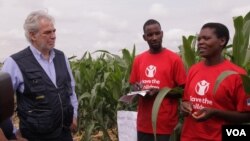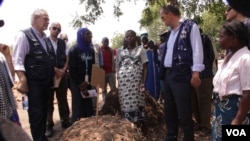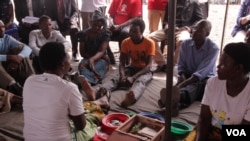The European Union has pledged its continued support towards vulnerable communities facing food shortages in Malawi. An EU commissioner made the pledge at the end of his three day visit to Malawi.
Nearly half of Malawi's population is facing the worst hunger situation in a decade.
This is largely because of the El Nino weather phenomenon, which caused flooding and then drought, leaving 6.7 million Malawians in need of food aid.
During his visit to Chikwawa district over the weekend, EU commissioner for Humanitarian Aid and Crisis Management Christos Stylianides told people how much the EU has already helped Malawi.
“Since El Nino started affecting Malawi the European Union has allocated nearly 16 million euros [$17 million] in emergency assistance in humanitarian need alone and of course disaster risk reduction projects to help the country’s most vulnerable,” Stylianides said.
Some cash has been given directly to the vulnerable communities to enable them to buy food and other basic necessities from the market.
Part of broader package
The assistance, Stylianides said, is part of the wider $55.1 million package (52 million euros) for the whole of southern Africa.
Early this year, the Southern African Development Community declared that nearly 30 million people were food insecure in the region.
The commissioner also said the EU will be providing $180.1 million (170 million euros) of development aid in Malawi for resilience and rural development action of relevance to the El Nino response.
“We are committed to help in this emergency as long as it takes. Our response will continue in the course of next year but, you know, [as] El Nino is the recurrent phenomenon, our common approach must go beyond immediate relief.”
EU-funded projects in southern Malawi include an irrigation scheme in Zomba.
Beatrice Wisiki, a single mother of five children, is a beneficiary of the project. She says that this is her second harvest of the year and that she is now a changed person. She says being a single mother of many children, she was one of the poorest people in the community but she says she has benefited a lot from this irrigation project and is able to now feed her family and send all her children to school.
The EU humanitarian aid will continue until the first harvest in March 2017.






